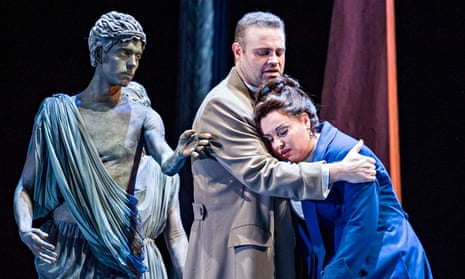An unnamed central European country on the brink of the first world war: this was one way to eliminate the confusions of time and place that have given Verdi’s Un ballo in maschera (1859) such a knotted history. The German director Katharina Thoma chose it for a new production at the Royal Opera House, in her house debut. The cast was strong, with star names – the Maltese tenor Joseph Calleja and the Russian baritone Dmitri Hvorostovksy – in key roles. No one booed. Some cheered. Why did it feel so underwhelming?
Courtesy of censors and politics, Verdi had to create his own set of disguises for an opera full of disguise, switching the true story of the assassination of King Gustav III of Sweden to neutral colonial Boston. For many, Un ballo in maschera is a Verdi favourite, with high-octane arias and music of immediate, light-dark invention written when he was at the peak of his powers. For others it remains a thin, binary mystery in which jocularity and tragedy, love and hate, life and death, shall I or shan’t I (give in to loving my husband’s best friend?) remain disparate, a set of polarities with no middle. Thoma’s approach compounded that weakness.
The opera’s prelude nimbly lays out the elements in four sections embracing courtiers, conspirators, lovers and murderous denouement. This went well on Thursday’s opening night, and the Royal Opera orchestra set sail with their usual panache. After that, all confidence in ensemble and flow evaporated. Daniel Oren, conducting, failed to make the music gel. Subtlety vanished. The chorus, usually superbly reliable, slithered and slipped around the beat at those very moments when precision was vital.
Calleja, as Riccardo, has effortless virtuosity and winning presence, which did much to bring life to the production. Liudmyla Monastyrska conveyed both the pity and ardour of Amelia, whom Riccardo loves but cannot have. Hvorostovsky returns, elegantly, to the role of her husband, Renato. He has sung it before; he will sing it again. At least when he appeared in the ROH’s last production (by Mario Martone), there was a spectacular mirrored ball scene.
This was drab and old-fashioned in comparison. Designed by Soutra Gilmour, it is set in a generic courtyard and a cemetery inspired by the Père Lachaise, Paris, complete with stone statues that come to spooky life. It all looks uncontroversial, which is the best, or perhaps worst, that can be said. The fortune-teller Ulrica (Marianne Cornetti) has become a Madame Blavatsky type, holding seances for daring females, some looking dangerously like turban-wearing “new women”.
Riccardo, who comes to consult Ulrica, turns up disguised in sailor suit and leaps on the table to sing with his courtiers, similarly attired around him like an overgrown Vienna boys’ choir. A sparkling Serena Gamberoni won special applause as Oscar, Riccardo’s page, who has music so cheerful you would never know such trouble was afoot.
Phantom Voices, a 50-minute sequence performed by the Clerks at St Leonard’s, Shoreditch, was the title of a late-night concert given as part of the Spitalfields Music winter festival. It was as ghostly and elusive as its name sounds. At the church door we were each handed an MP3 player and told to press play at the start of the concert and listen through one earpiece. What followed ranged from exquisite musical performance to nightmarish, headache-inducing racket. The programme stated: “At each stage the music is haunted by other pieces of music and other lyrics; each movement reveals itself as a hallucination of another.”
The Clerks, a six-strong ensemble directed by Edward Wickham, sang a patchwork of original music by Christopher Fox, linking Bach, Heinrich Isaac (c1450-1517) and traditional bluegrass via a children’s song. A soundtrack of unidentified voices talked about the death of Webern, among other things. Musical hallucination is a term used by psychologists to describe the way we formulate music in our head – familiar tunes that stick there and annoy us, snatches of symphonies, imagined harmonies or the white noise of tinnitus. Supported by the Wellcome Trust, the performance was part of a project, Hearing the Voice, at Durham University.
The experience was debilitating, almost unbearable, with the brain struggling to cancel out extraneous noises in order to hear the purity of the Clerks – terrific musicians – singing early polyphony. That was the point. I may have to put myself up as a case study: only the night before I dreamed I was at an experimental music concert in a warehouse (yeah, yeah). The main instrument was an old bicycle, its pedals whirred by a devil figure who also doubled on spokes, pump and bell. I’d have given it quite a good review. I am happy, nevertheless, amid the merry ding dong, to sign off until the new year and search for silence.
Star ratings (out of 5)
Un ballo in maschera **
Phantom Voices ***

Comments (…)
Sign in or create your Guardian account to join the discussion